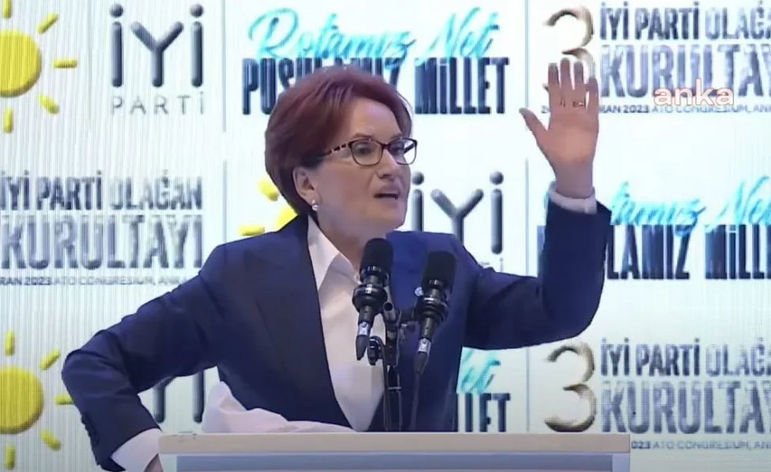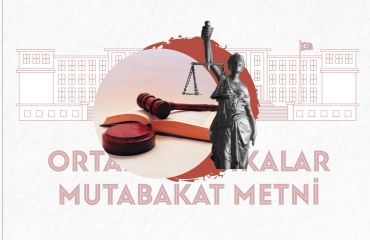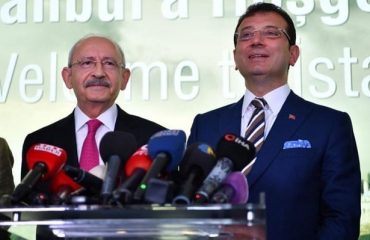

Akşener’s outbursts at the İYİ Party congress were interpreted and criticised as dead-end for the opposition alliance, but this is not the case. If the İYİ Party and CHP do not enter into an alliance in the local elections, Istanbul, Ankara and many other metropolises may fall to the AKP or MHP.
After losing in the May presidential and legislative elections, Türkiye’s opposition is in turmoil both inner-party struggles and within the coalition it created prior to the elections.
The six party opposition’s People Alliance’s partner İYİ Party’s first party congress after the elections held in Ankara on 24-25 June.
The party’s leader Meral Akşener’s first speech after the election was full of harsh comments, fueling the discussions that the opposition is in dead-end both in party and in the alliance.
How to interpret her long-speech? We can categorize the underlines of her speech in three main topics:
Did she turn the wheel to the dead end?
The interpretation that the İYİ Party and its leader Akşener burned bridges with its People Alliance partner Republican People’s Party (CHP) and its leader Kemal Kılıçdaroğlu stems mostly from her statement that her “biggest regret” was that she asked 15 deputies from the CHP before the 2018 elections.
During the 2018 elections, the İYİ Party, which did not have the right to participate in the elections due to its new establishment, formed a group by requesting 15 deputies from the CHP, and gained the right to enter the elections with this solidarity led by CHP Leader Kemal Kılıçdaroğlu.
This solidarity later led to the establishment of the Millet Alliance, and it was evaluated that it played a major role in winning the elections in Istanbul and Ankara in the 2019 local elections.
With the transformation of the Millet Alliance into a table of 6, the parties worked together during the 2023 elections, but both the presidential candidacy and internal discussions in the election had come to a point where Meral Akşener rested the table.
In her speech at the congress, Akşener described her request for 15 deputies from the CHP, which initiated the Millet Alliance coalition, as “the biggest regret of her life”, stirring the rumors that the alliance is in dead end.
Reminding that Akşener had previously said that she would be grateful to Kılıçdaroğlu for this reason for the rest of her life, some accused her of being “ungrateful”.
Some interpreted her comments as İYİ Party would no longer cooperate with the CHP especially in the upcoming March 31 2024 local elections, when she said “everyone goes their own way.”
Their confrontation with the other four parties in the Millet Alliance for Kılıçdaroğlu’s candidacy and being forced to support the Kurdish-issue focused HDP (Green Left) made it necessary for the İYİ Party not to establish an alliance with the CHP in the local elections.
But was this really the case, are they in a dead end?
Did Akşener finished her party?
After Akşener left the Nationalist Movement Party (MHP) and completed the establishment of the İYİ Party, she declared her goal as reviving a centre-right body similar to former president Süleyman Demirel’s Justice Party (Adalet Partisi).
The 2018 parliamentary structure also indicated this. However, it was discussed that with the table of six, Kılıçdaroğlu’s candidacy and finally the 2023 parliamentary composition, the names known to be “centre-right” were purged from the party and the “Grey Wolves (Ülkücü) brothers” put their weight on; was the party becoming MHP-oriented again?
Journalist Fehmi Koru reminded that neither Demirel, Adnan Menderes nor Tayyip Erdoğan complained to the public about internal party conflicts and their allies, and questioned whether the founder of the party had the right to dissolve it. He added that this was not in line with the centre-right tradition.
Koru did not write so, but in this case, İYİ Party could have been absorbed by the AKP and MHP in a short time.
Did Akşener purged the nationalists?
When those who looked at the list of the General Administrative Board formed at the congress did not see some “heavy names” there, they interpreted that Akşener, in reaction to what she experienced during the election process and with the power she received from her almost unanimous re-election as the İYİ Party Leader, also purged the heavyweights. The 6 staff members who were previously in the board were no longer there.
Having purged both centre-right and nationalist figures, with whom would Akşener continue her journey?
Perhaps it is easiest to start discussing these allegations from the last one.
First of all, not all of the six names no longer in the board are of MHP-Grey Wolves (Ülkücü) origin. The other two names in the İYİ Party parliamentary management are also from the “Ülkücü brothers”. What more can be done?
However, Akşener’s new board includes names from academia and the business world who have not been involved in politics much before, which may be the intention of a new beginning; we will have to wait and see.
When the intra-party self-criticism made openly
On the other hand, when Akşener faced the İYİ Party openly and did not name names (which I think has a place in politics) and used an angry tone, this was initially perceived as a criticism of the CHP and Kılıçdaroğlu as if it were self-criticism.
There was a lot of reaction. Kılıçdaroğlu’s phone call to Akşener to congratulate her on her re-election changed the situation in terms of political psychology.
Finally, “a close colleague of Akşener” told Sözcü’s Saygı Öztürk that Akşener did not target the CHP with her words “I regret” and that she thanked Kılıçdaroğlu again immediately afterwards. What Akşener wanted to say that the İYİ Party should have fought and won the 2018 elections instead of borrowing 15 deputies from the CHP and gaining the right to run in the elections. Otherwise, she was still grateful to Kılıçdaroğlu for his support. What they said was not indicate a dead end.
According to her colleague, what “drove Akşener crazy” were the İYİ Party members who claimed that they had been sold parliamentary candidate slots in exchange for money; she was parting ways with them.
Let’s talk about why the İYİ Party and CHP will not easily part ways.
İYİ Party and CHP dead end in local elections
An objective look at the political outlook shows that if the İYİ Party and CHP do not enter into an alliance in the local elections on 31 March 2024, many metropolitan mayorships, especially in Istanbul and Ankara, may fall from the CHP’s hands and fall into the hands of the AKP or MHP.
However, as in the opposition front, different alliance or co-operation modalities are on the agenda this time on the government front.
As a matter of fact, following the recent meeting between President Tayyip Erdoğan and MHP leader Devlet Bahçeli, the proposal that the MHP should support the AKP candidate in provinces such as Istanbul, Ankara and Izmir, and that the AKP should support the candidate nominated by the MHP in provinces such as Adana, Mersin and Manisa has started to be discussed.
After the congress, a similar formula started to be discussed in İYİ Party circles. İYİ Party could have asked CHP to support its metropolitan candidate in some provinces. Interestingly, the İYİ Party also wanted to nominate a candidate in the same provinces as the MHP, namely Adana, Mersin, Manisa and Antalya.
What about CHP?
The lock and the key will be Istanbul and Ankara. The CHP needs more than the support of İYİ Party to hold on to these metropolitan mayorships, but this seems more possible with a different alliance model.
Of course, there is a precondition here; that is for the CHP to find its new course as soon as possible.
In recent days, messages to Kılıçdaroğlu from within the CHP have increased. Murat Karayalçın’s statement to Ceren Bayar of Duvar that “CHP politics is determined by an oligarchic structure”, Sezgin Tanrıkulu’s criticism to Cansu Çamlıbel in T24 (without being too hard on Kılıçdaroğlu) that the election campaign failed due to “impositions from the headquarters” are among these examples.
In response, Bülent Tezcan, one of the closest figures to Kılıçdaroğlu, told BBC Turkish’s Ayşe Sayın that a change was needed “including himself and the chairman”, which points to new developments after the Eid al-Adha holiday.

